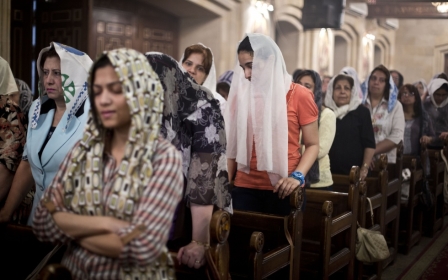IN PICTURES: Relatives of Egyptian Christians killed by IS speak out

Al-AOUR, Minya Egypt - The residents of al-Aour, a dusty village in Minya governorate some 250km south of Cairo, are struggling to come to terms with their loss. Last week, 13 residents of the village, all Coptic Christians, were executed by Islamic State fighters in Libya.
When news of the executions broke (IS released a graphic video of the killing on the Internet) women and children in homes across the village, which is home to 2,500 Christians, could be heard screaming.
When I visited al-Aour last week, people were sad and dismayed at the killings. Others seemed proud, calling the fallen "martyrs" and "heroes".
"I am happy for my relatives. They had faith in God. They had faith in Jesus Christ and that is what matters,” Bishop Feloubes Fawzy, 43, who lost his nephew and four of his cousins, told Middle East Eye.
“They died for their faith. They died for Christianity."
Fifi Shehata, whose father Maged, 41, was killed also felt that their death was not in vain.
"My father died like a lion. He did not bow his head down. IS has no religion or mercy. I am now from the city of the martyrs. The city of the brave lions. May God forgive the killers. We don't have hatred towards them - this is Christianity. God forgives the sinners, so shall we," she said.
Twenty-one Egyptians, all migrant workers in Libya, were seized in the middle of the night in early January when masked gunmen broke into their dormitory.
"We came for the Christians. Stay away," Milad Ibrahim, whose two cousins were abducted from an adjacent dormitory, recalled the Islamic State fighters telling him.
The 2000km journey from al-Aour to Libya can take days but many here, faced by poverty and unemployment, chose to make it.
Shenouda Shokry, an Egyptian farmer who made the journey to Libya twice for work and whose brother Youssef was one of those killed by IS, said that people usually have to pay an average of EGP 8,000 ($1,050) for a Libyan visa and flights.
Before a revolution ousted Libyan leader, Muammer Gaddafi in 2011, there were some 2 million Egyptian migrants in Libya. Today there are around 750,000, although thousands have reportedly returned since the execution of the 21 men.
Despite the growing violence, many continue to insist that Libya remains a place where you can make good money quickly.
Stay informed with MEE's newsletters
Sign up to get the latest alerts, insights and analysis, starting with Turkey Unpacked
Middle East Eye delivers independent and unrivalled coverage and analysis of the Middle East, North Africa and beyond. To learn more about republishing this content and the associated fees, please fill out this form. More about MEE can be found here.




